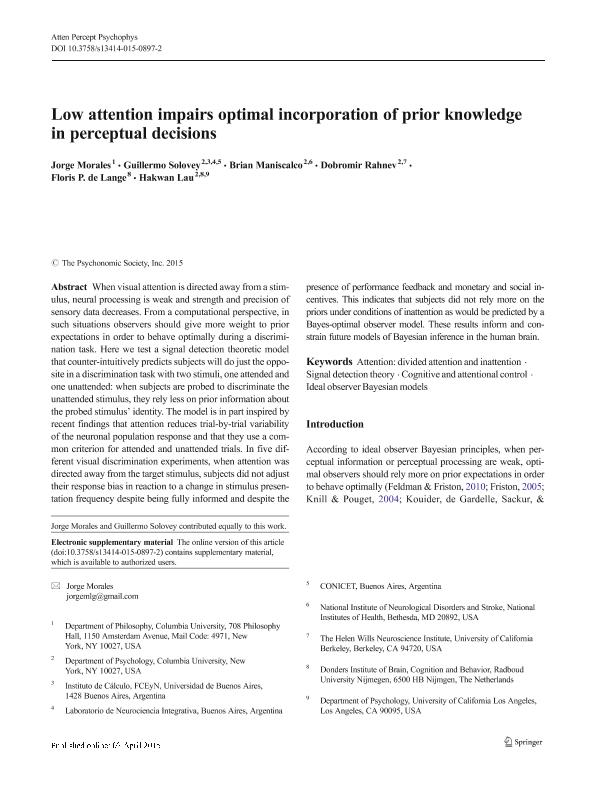Artículo
Low attention impairs optimal incorporation of prior knowledge in perceptual decisions
Morales, Jorge Luis; Solovey, Guillermo ; Maniscalco, Brian; Rahnev, Drobomir; de Lange, Floris P.; Lau, Hakwan
; Maniscalco, Brian; Rahnev, Drobomir; de Lange, Floris P.; Lau, Hakwan
 ; Maniscalco, Brian; Rahnev, Drobomir; de Lange, Floris P.; Lau, Hakwan
; Maniscalco, Brian; Rahnev, Drobomir; de Lange, Floris P.; Lau, Hakwan
Fecha de publicación:
08/2015
Editorial:
Psychonomic Society
Revista:
Attention Perception & Psychophysics
ISSN:
1943-3921
e-ISSN:
1943-393X
Idioma:
Inglés
Tipo de recurso:
Artículo publicado
Clasificación temática:
Resumen
When visual attention is directed away from a stimulus, neural processing is weak and strength and precision of sensory data decreases. From a computational perspective, in such situations observers should give more weight to prior expectations in order to behave optimally during a discrimination task. Here we test a signal detection theoretic model that counter-intuitively predicts subjects will do just the opposite in a discrimination task with two stimuli, one attended and one unattended: when subjects are probed to discriminate the unattended stimulus, they rely less on prior information about the probed stimulus’ identity. The model is in part inspired by recent findings that attention reduces trial-by-trial variability of the neuronal population response and that they use a common criterion for attended and unattended trials. In five different visual discrimination experiments, when attention was directed away from the target stimulus, subjects did not adjust their response bias in reaction to a change in stimulus presentation frequency despite being fully informed and despite the presence of performance feedback and monetary and social incentives. This indicates that subjects did not rely more on the priors under conditions of inattention as would be predicted by a Bayes-optimal observer model. These results inform and constrain future models of Bayesian inference in the human brain.
Archivos asociados
Licencia
Identificadores
Colecciones
Articulos(OCA CIUDAD UNIVERSITARIA)
Articulos de OFICINA DE COORDINACION ADMINISTRATIVA CIUDAD UNIVERSITARIA
Articulos de OFICINA DE COORDINACION ADMINISTRATIVA CIUDAD UNIVERSITARIA
Citación
Morales, Jorge Luis; Solovey, Guillermo; Maniscalco, Brian; Rahnev, Drobomir; de Lange, Floris P.; et al.; Low attention impairs optimal incorporation of prior knowledge in perceptual decisions; Psychonomic Society; Attention Perception & Psychophysics; 77; 6; 8-2015; 2021-2036
Compartir
Altmétricas



